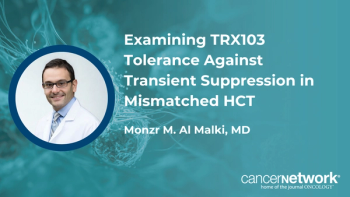
Oncology NEWS International
- Oncology NEWS International Vol 8 No 1
- Volume 8
- Issue 1
Some AIDS Experts Now Question ‘Hit Hard, Hit Early’ Strategy
SAN DIEGO-“When do you start HIV therapy and what do you start with?” Michael S. Saag, MD, asked to open a seminar on retroviral therapy at the 38th Interscience Conference on Antimicrobial Agents and Chemotherapy (ICAAC). As simplistic as it sounds, he said, it is a question that initiates the process of strategic thinking on the use of antiretroviral therapy.
SAN DIEGOWhen do you start HIV therapy and what do you start with? Michael S. Saag, MD, asked to open a seminar on retroviral therapy at the 38th Interscience Conference on Antimicrobial Agents and Chemotherapy (ICAAC). As simplistic as it sounds, he said, it is a question that initiates the process of strategic thinking on the use of antiretroviral therapy.
The success of three-drug regimens in reducing viral load have led many to suggest a policy of hit hard, hit early, but in looking at post-1996/1997 studies showing cases of resistance and intolerable side effects, Dr. Saag, of the University of Alabama, Birmingham, said that this should not be a firm rule for all HIV-infected individuals.
Hitting hard and early, he said, assumes that patients actually adhere to the therapeutic regimen, that the regimens have predictable pharmacokinetics, that toxicity is appropriate, and that the regimens lead to undetectable HIV levels, or complete HIV suppression.
An alternative therapeutic scenario begins with the expectation of failure and the need for clinicians to keep their options open if the initial therapy proves unsuccessful. While you want to stay ahead of the virus, Dr. Saag said, a better rule may be to hit relatively easy and just hard enough. But first, he noted, physicians must define their parameters of both success and failure so that they know when its time to switch regimens.
With about a dozen antiretroviral agents now available, clinicians do have more treatment options, said Jonathan Schapiro, MD, of Tel Hashomer Hospital, Tel Aviv, Israel. But drug failures occur for a variety of reasonsincluding lack of adherence, problems with absorption and metabolism, drug interactions, or drug resistanceand Dr. Schapiro asked, at what point do you switch?
Individualize Therapeutic Goals
Circumstances vary with each patient, he said, and the goals of therapy must be tailored to the individual patient. With therapy-naïve patients, shoot for durable viral suppression, Dr. Schapiro advised. Experienced patients are looking for a stable viral load, and in highly experienced patientsthe ones who have seen everything, twiceyour interest should be in achieving a significant reduction in viral load.
When considering whether to switch early when a regimen appears to be failing or delay until later, Dr. Schapiro noted several considerations:
Are good therapeutic options still available?
Is the current regimen still challenging to the patient?
Is the patients immunologic status deteriorating?
If few therapeutic options are left, the current regimen is well tolerated, and the patients immunologic status is stable or improving, he suggested that the clinician delay switching therapy.
This is the strategy Steven Deeks, MD, of San Francisco General Hospital, advocated in his presentation on salvage therapy. The decision to switch therapy must be weighed against concerns over the limited number of antiretroviral agents available, he said. The failure of any switch will limit options down the road.
When one of his patients fails more than one protease inhibitor, Dr. Deeks approach has been to keep the patient on whatever drug combination is best tolerated. The goal is not to switch to new drugs but to a new class of drugs, he said.
But dont switch too soon, he cautioned. For some patients, its best to let the virus do what it needs to do for a whilea year or twoand then look at other treatment options, he said. Dont keep switching regimens immediately with each failure.
Articles in this issue
about 27 years ago
Pittsburgh to Build New Cancer Centerabout 27 years ago
NCI Initiates Two High-Priority Tobacco Research Programsabout 27 years ago
Breast Cancer Stamp Sells Wellabout 27 years ago
Hospital Strategies To Prevent Invasive Aspergillosis Spreadabout 27 years ago
‘Cancer Patients Should Be Assertive, Know Their Rights’about 27 years ago
EBCTCG Update of Adjuvant Treatment for Early Breast Cancerabout 27 years ago
Younger Breast Cancer Patients at Increased Risk of Recurrenceabout 27 years ago
Six Named to National Cancer Advisory Boardabout 27 years ago
Trial Uses Vitamin A To Prevent Lung Cancer in Former Smokersabout 27 years ago
‘Medical School Curriculum Must Include Palliative Care’Newsletter
Stay up to date on recent advances in the multidisciplinary approach to cancer.










































